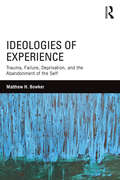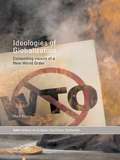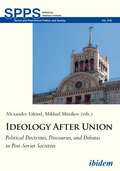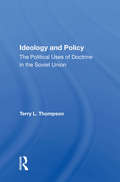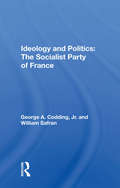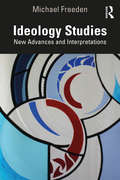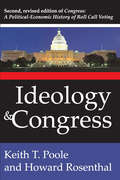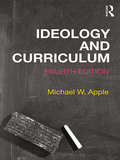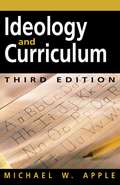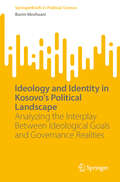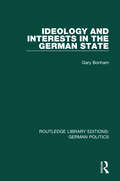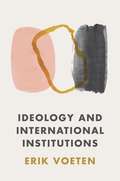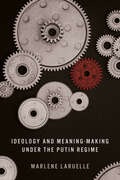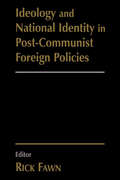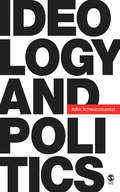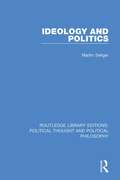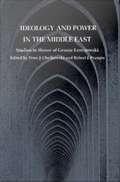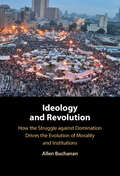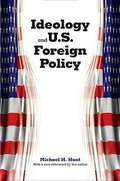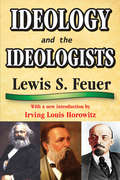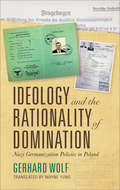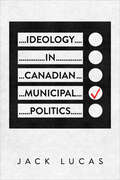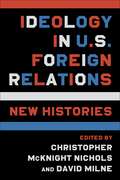- Table View
- List View
Ideologies of Experience: Trauma, Failure, Deprivation, and the Abandonment of the Self
by Matthew H. BowkerMatthew H. Bowker offers a novel analysis of "experience": the vast and influential concept that has shaped Western social theory and political practice for the past half-millennium. While it is difficult to find a branch of modern thought, science, industry, or art that has not relied in some way on the notion of "experience" in defining its assumptions or aims, no study has yet applied a politically-conscious and psychologically-sensitive critique to the construct of experience. Doing so reveals that most of the qualities that have been attributed to experience over the centuries — particularly its unthinkability, its correspondence with suffering, and its occlusion of the self — are part of unlikely fantasies or ideologies. By analyzing a series of related cases, including the experiential education movement, the ascendency of trauma theory, the philosophy of the social contract, and the psychological study of social isolation, the book builds a convincing case that ideologies of experience are invoked not to keep us close to lived realities and ‘things-in-themselves,’ but, rather, to distort and destroy true knowledge of ourselves and others. In spite of enduring admiration for those who may be called champions of experience, such as Michel de Montaigne, Ralph Waldo Emerson, and others treated throughout the work, the ideologies of experience ultimately discourage individuals and groups from creating, resisting, and changing our experience, urging us instead to embrace trauma, failure, deprivation, and self-abandonment.
Ideologies of Globalization: Contending Visions of a New World Order (RIPE Series in Global Political Economy)
by Mark RupertThis book examines the key debates about globalization and provides a detailed and incisive analysis of the varied and often contradictory opposition to globalization within the United States.Subjects covered include:* the historical context of the development of globalization in the US in the post-war period* opposition to the North American Free Trade Agreement (NAFTA), the General Agreement on Trade & Tariffs (GATT) & the World Trade Organisation (WTO)* the nationalist response to globalization from 'militia' groups and others on the extreme right* the populist backlash against globalization* recent moves by advocates of the free market to present 'globalization with a human face'.
Ideology After Union: Political Doctrines, Discourses, and Debates in Post-Soviet Societies (Soviet and Post-Soviet Politics and Society #216)
by Alexander Minakov Mykhailo EtkindThe recent history of post-Soviet societies is often described in terms of the transition metaphor. Images of movement as well as changing places and situations were foundational for the social conceptualization of the new nations. The idea of looking for novelty and new beginnings legitimized the dissolution of the USSR as well as many state- and economy-related experiments. This volume describes how the new societies survived this period of regime change, economic crises, internal wars, political drawbacks, and social innovations, and how they are making sense of it.The volume’s contributors include Russian, Ukrainian, and German scholars who analyze political, social, and cultural ideologies: Natalia Koulinka, Kostiantyn Fedorenko, Pavel Skigin, Jesko Schmoller, Valentyna Kyselova, Anton Avksentiev, Chris Monday, Egor Isaev, Oleksandr Zabirko, Sergiy Kurbatov, Alla Marchenko, Jennifer J. Carroll, Daria Goriacheva, and Darya Malyutina.
Ideology And Policy: The Political Uses Of Doctrine In The Soviet Union
by Terry L ThompsonRepresenting a milestone of further accomplishment in scholarly investigation of the dialectics for ideological evolution in the USSR, this book will be a treasure for all who are interested in the development of Soviet ideology and should merit the attention of all specialists in Soviet studies. It is uniquely valuable because it is the first exte
Ideology And Politics: The Socialist Party Of France
by George A. CoddingThis book explores the strengths and weaknesses of the French Socialist party—its history, ideology, organization, and constituency—as well as the reasons the party has remained a viable force in the French political system for over seventy years.
Ideology Studies: New Advances and Interpretations
by Michael FreedenThis book comprehensively collects the thinking - over the last 25 years - of one the most important contemporary scholars in the field of ideology studies. Clearly organised, it expounds on the changing nature of the sub-discipline, its components and methods of investigation. As such, it serves the need for a general, well-informed identification and elaboration of thematic possibilities in current ideology studies and represents the most developed and productive methodological approach to the study of ideologies in the last three decades. Freeden presents ideology studies as an evolving and vibrant field, encountering and surmounting a series of challenges in its successful path towards recognition as a fully legitimate and respected branch of political theory. This book will be of key interest to students and scholars of political ideologies, political theory, political philosophy and more broadly to sociology, political science, anthropology, human geography, international studies and the humanities.
Ideology and Congress: A Political Economic History of Roll Call Voting
by Howard RosenthalIn Ideology and Congress, authors Poole and Rosenthal have analyzed over 13 million individual roll call votes spanning the two centuries since Congress began recording votes in 1789. By tracing the voting patterns of Congress throughout the country's history, the authors find that, despite a wide array of issues facing legislators, over 81 percent of their voting decisions can be attributed to a consistent ideological position ranging from ultraconservatism to ultraliberalism. In their classic 1997 volume, Congress: A Political Economic History of Roll Call Voting, roll call voting became the framework for a novel interpretation of important episodes in American political and economic history. Congress demonstrated that roll call voting has a very simple structure and that, for most of American history, roll call voting patterns have maintained a core stability based on two great issues: the extent of government regulation of, and intervention in, the economy; and race. In this new, paperback volume, the authors include nineteen years of additional data, bringing in the period from 1986 through 2004.
Ideology and Curriculum
by Michael AppleSince 1979, Ideology and Curriculum has been a path breaking statement on the relationship between cultural and economic power in education. The new edition of this now classic text has been updated by celebrated author and activist Michael W. Apple to include a full new chapter on the book’s lasting critical agenda in the context of the contemporary conservative climate. A new substantive preface introduces the fourth edition, reflecting on earlier arguments and developments from the intervening years while a concluding interview details the author’s background and continuing efforts toward building a more equitable society. In celebration of the 40th anniversary of its publication, this highly-anticipated new edition firmly situates Ideology and Curriculum as one of the most important education titles of our time.
Ideology and Curriculum (3rd Edition)
by Michael W. AppleTo celebrate the 25th anniversary of its publication, Michael W. Apple has thoroughly updated his influential text, and written a new preface. The new edition also includes an extended interview circa 2001, in which Apple relates the critical agenda outlined in Ideology and Curriculum to the more contemporary conservative climate. Finally, a new chapter titled "Pedagogy, Patriotism and Democracy: Ideology and Education After 9/11" is also included.
Ideology and Identity in Kosovo's Political Landscape: Analyzing the Interplay Between Ideological Goals and Governance Realities (SpringerBriefs in Political Science)
by Burim MexhuaniThis Brief discusses political ideologies and their role in shaping Kosovo's post-conflict political landscape. Drawing on extensive research and analysis, this book offers a comprehensive examination of party competition, state-building, and the influence of the European Union (EU) in Kosovo's political future. The book raises important questions about the role of political ideologies in post-conflict states, the dynamics of party competition, and the influence of external actors like the EU. It prompts readers to critically analyze the relationship between ideologies, governance realities, and the broader context of Balkan politics. By providing in-depth analysis, case studies, and theoretical frameworks, the book offers answers and solutions to these questions, enabling readers to gain a deeper understanding of the complexities of Kosovo's political landscape. As such, this Brief will be appropriate for researchers and students interested in comparative politics, conflict studies, democratization, post-conflict governance, party systems, and EU integration.
Ideology and Interests in the German State (Routledge Library Editions: German Politics)
by Gary BonhamThis book addresses major theoretical issues in the fields of public administration and comparative politics. It discusses the role which ideology played as a unifying force for at least parts of the German state bureaucracy in Wilhelmine Germany . The examination of a modernizing ideology in the German case is useful for an understanding of the political dynamics of state-led modernization and industrial strategy in many contemporary societies and the author explains political behaviour and relations in Germany in general terms that are universally relevant.
Ideology and International Institutions
by Erik VoetenA new theoretical framework for understanding how social, economic, and political conflicts influence international institutions and their place in the global order Today’s liberal international institutional order is being challenged by the rising power of illiberal states and by domestic political changes inside liberal states. Against this backdrop, Ideology and International Institutions offers a broader understanding of international institutions by arguing that the politics of multilateralism has always been based on ideology and ideological divisions. Erik Voeten develops new theories and measures to make sense of past and current challenges to multilateral institutions.Voeten presents a straightforward theoretical framework that analyzes multilateral institutions as attempts by states to shift the policies of others toward their preferred ideological positions. He then measures how states have positioned themselves in global ideological conflicts during the past seventy-five years. Empirical chapters illustrate how ideological struggles shape the design of international institutions, membership in international institutions, and the critical role of multilateral institutions in militarized conflicts. Voeten also examines populism’s rise and other ideological threats to the liberal international order.Ideology and International Institutions explores the essential ways in which ideological contestation has influenced world politics.
Ideology and Meaning-Making under the Putin Regime
by Marlene LaruelleMuch has been written to try to understand the ideological characteristics of the current Russian government, as well as what is happening inside the mind of Vladimir Putin. Refusing pundits' clichés that depict the Russian regime as either a cynical kleptocracy or the product of Putin's grand Machiavellian designs, Ideology and Meaning-Making under the Putin Regime offers a critical genealogy of ideology in Russia today. Marlene Laruelle provides an innovative, multi-method analysis of the Russian regime's ideological production process and the ways it is operationalized in both domestic and foreign policies. Ideology and Meaning-Making under the Putin Regime reclaims the study of ideology as an unavoidable component of the tools we use to render the world intelligible and represents a significant contribution to the scholarly debate on the interaction between ideas and policy decisions. By placing the current Russian regime into a broader context of different strains of strategic culture, ideological interest groups, and intellectual history, this book gives readers key insights into how the Russo-Ukrainian War became possible and the role ideology played in enabling it.
Ideology and National Identity in Post-communist Foreign Policy
by Rick FawnA comparative analysis of the foreign policies of eight post-communist states which considers the extent to which official communist ideology has been replaced by nationalism and establishes how these states express their national identities through foreign policy.
Ideology and Politics
by Dr John J Schwarzmantel'Successfully challenges the notion that we live in a post-ideological age. John Schwarzmantel searchingly questions the thesis that only single issues and identities matter, providing a reliable compass to help students navigate through a world that has witnessed the death of Communism and the rise of neo-liberal hegemony' - Jules Townshend, Professor of Political Theory, Manchester Metropolitan University This book challenges the idea of post-ideological consensus and offers a fresh perspective on the current state of political ideologies. With 'traditional' political ideologies, such as liberalism, socialism, nationalism and conservatism, perceived to be in crisis, it assesses: - Their continued relevance in the context of globalisation and of scepticism towards ideological thinking - The challenges posed by 'new' ideologies such as ecologism and feminism - The implications of new social movements and ideas of community and multiculturalism for the traditional Left-Right political framework. Ideology and Politics presents an accessible account of a new era of ideological politics, where the dominant neo-liberalism has spawned a diverse global range of 'ideologies of opposition'. It situates these radical frameworks of change and protest in relation to more traditional 'anti' ideologies and seeks to re-establish the relevance of ideologies for political action in the contemporary world. This text will be core reading for students of politics at advanced undergraduate and postgraduate level.
Ideology and Politics (Routledge Library Editions: Political Thought and Political Philosophy #52)
by Martin SeligerFirst published in 1976. Ideology plays an important role in many fields of human activity and has therefore been dealt with directly and indirectly in a vast number of studies, but a generally accepted definition of the term is lacking even in the various branches of social and political science. This book - the first since Mannheim to elaborate a comprehensive theory of ideology - seeks to offer a generally applicable definition, a task which of necessity involves taking issue with the logical and political implications of the conceptions in current use and which touches on central problems of politics and political science. Professor Seliger's theory is based on an approach and conceptualizations which will appeal both to ’traditionalists’ and 'behaviourists' since he gives due weight to both kinds of literature. Indeed, this book reflects throughout a detachment and independence of thought which are refreshing and opens up the way for both theorists and practising politicians to re-examine ideological tenets in the light of actual and feasible policy orientations and embark upon ideological reconstruction.
Ideology and Power in the Middle East: Studies in Honor of George Lenczowski
by Peter J. Chelkowski Robert J. PrangerScholars from the United States, Canada, Europe, and the Middle East combine their talents and expertise to honor George Lenczowski, whose studies of the Middle East over two generations have made him a foremost expert on contemporary affairs in this most volatile and complex region.
Ideology and Revolution: How the Struggle against Domination Drives the Evolution of Morality and Institutions
by Allen BuchananIn our society there is a constant struggle between powerful, institutionalized hierarchies and people who try to resist them. Whether this resistance succeeds (either partially or completely) or fails, the struggle causes large-scale social change, including changes in morality and institutions and in how hierarchy and the struggle itself are conceived. In this book, Allen Buchanan analyzes the complex connections between the struggle for liberation from domination, ideology, and changes in morality and institutions, and develops a conflict theory of social change, which is systematically laid out in five clear components with a chapter dedicated to each. He examines the co-evolutionary and co-dependent nature of the struggle between hierarchs and resisters, and the appeals to morality which are routinely made by both sides. His book will be of interest to a broad readership of students and scholars in philosophy, history, political science, economics, sociology, and law.
Ideology and Spatial Voting in American Elections
by Stephen A. JesseeIdeology and Spatial Voting in American Elections addresses two core issues related to the foundations of democratic governance: how the political views of Americans are structured and how citizens' voting decisions relate to their ideological proximity to the candidates. Focusing on testing the assumptions and implications of spatial voting, this book connects the theory with empirical analysis of voter preferences and behavior, showing Americans cast their ballots largely in accordance with spatial voting theory. Stephen A. Jessee's research shows voters possess meaningful ideologies that structure their policy beliefs, moderated by partisanship and differing levels of political information. Jessee finds that while voters with lower levels of political information are more influenced by partisanship, independents and better informed partisans are able to form reasonably accurate perceptions of candidates' ideologies. His findings should reaffirm citizens' faith in the broad functioning of democratic elections.
Ideology and U.S. Foreign Policy
by Michael H. HuntThis new edition of Michael H. Hunt's classic reinterpretation of American diplomatic history includes a preface that reflects on the personal experience and intellectual agenda behind the writing of the book, surveys the broad impact of the book's argument, and addresses the challenges to the thesis since the book's original publication. In the wake of 9/11 this interpretation is more pertinent than ever.
Ideology and the Ideologists
by Howard RosenthalThe revival of ideology, which began early in the second half of the last century, has led to reconsideration of the following questions: What underlies the pattern of the rise and decline of the ideological mode of thought? What leads young intellectuals to search for an ideology? What accounts for the changes in ideological fashion over time and nation, and shifts from one set of philosophical tenets to another? Who indeed are the ""intellectuals?""Studies of ideology have tended to range themselves for or against particular viewpoints, or have concerned themselves with defining perspectives. The purpose of this book is to examine the common causal patterns in the development of various differing ideologies. Feuer finds that any ideology may be said to be composed of three ingredients: The most basic and invariant is some form of Mosaic myth. Every ideology also has its characteristic philosophical tenets spreading from left to right, which conform to the cycle of ideas; and, finally, an ideology must be taken up by some section of the population who can translate it into action.Intellectuals in generational revolt find in some version of the ideological myth a charter and dramatization of their emotions, aims, and actions. Since each generation of intellectuals tends to reject its predecessors' doctrines, a law of intellectual fashion arises the alternation of philosophical doctrines. Ideology has inevitably made for an authoritarian presumption on the part of master-intellectuals and marginal ones and assumes their antagonism to objective truth and science. It is Feuer's contention that only when intellectuals abandon ideology in favor of science or scholarship will an unfortunate chapter in the history of human unreasonbe overcome.
Ideology and the Rationality of Domination: Nazi Germanization Policies in Poland
by Gerhard WolfThis &“well-researched, clear [and] convincing&” historical study examines the ideology and politics of Germanization during the WWII occupation of Poland (Nicholas Stargardt, author of The German War). Following the brutal invasion and occupation of Poland, the Nazis moved swiftly to realize one of their key ideological aims: the expansion of German living space. This involved deporting Jews, bringing in German settlers, and establishing an evaluation process that separated Poles from ethnic Germans. As simple as this might have seemed initially, the various parts of the German occupation machinery were soon embroiled in a bitter fight about the essence of Germanness and how to identify a German. In this illuminating study, Gerhard Wolf reveals an astonishing development in which a more inclusive understanding of Germanness based on the notion of Volk won out against an exclusive definition based on Rasse. As Wolf demonstrates, this decision paved the way for turning three million Poles into German citizens. Parallel to the mass deportation and murder of Christian Poles and the genocide of Jewish Poles, the Nazis paradoxically also presided over the largest (forced) assimilation program in German history. Students and scholars of the Second World War, the Holocaust, and Nazism will find new analysis of German imperialism, ethnic cleansing, and genocide in this important book.
Ideology in America
by Christopher Ellis James A. StimsonPublic opinion in the United States contains a paradox. The American public is symbolically conservative: it cherishes the symbols of conservatism and is more likely to identify as conservative than as liberal. Yet at the same time, it is operationally liberal, wanting government to do and spend more to solve a variety of social problems. This book focuses on understanding this contradiction. It argues that both facets of public opinion are real and lasting, not artifacts of the survey context or isolated to particular points in time. By exploring the ideological attitudes of the American public as a whole, and the seemingly conflicted choices of individual citizens, it explains the foundations of this paradox. The keys to understanding this large-scale contradiction, and to thinking about its consequences, are found in Americans' attitudes with respect to religion and culture and in the frames in which elite actors describe policy issues.
Ideology in Canadian Municipal Politics
by Jack LucasOne of the most peculiar features of municipal politics in Canada is how frequently local politicians, activists, and scholars disagree about how to describe the municipal arena. For some, municipal politics is distinct from other levels of government, a world of non-ideological elections, pragmatic and technical policymaking, and issue-by-issue policy coalitions. Others argue that municipal politics is similar to politics at other scales, with persistent axes of political disagreement and a recognizable “left” and “right.” This recurring debate features prominently in municipal election campaigns across Canada. In Ideology in Canadian Municipal Politics, Jack Lucas investigates municipal ideology in Canada. Using data from original surveys of municipal politicians and the Canadian public, the book reveals how municipal politics is clearly structured by left-right ideology. It shows that municipal politicians represent their constituents’ ideological preferences quite well: they understand their constituents’ ideological perspectives, they align with their constituents’ preferences, and they are elected in part because of their ideological alignment with voters. A lively and accessible study, Ideology in Canadian Municipal Politics will appeal to readers interested in municipal politics, political ideology, and political representation.
Ideology in U.S. Foreign Relations: New Histories
by Nichols, Christopher McKnight; Milne, DavidIdeology drives American foreign policy in ways seen and unseen. Racialized notions of subjecthood and civilization underlay the political revolution of eighteenth-century white colonizers; neoconservatism, neoliberalism, and unilateralism propelled the post–Cold War United States to unleash catastrophe in the Middle East. Ideologies order and explain the world, project the illusion of controllable outcomes, and often explain success and failure. How does the history of U.S. foreign relations appear differently when viewed through the lens of ideology?This book explores the ideological landscape of international relations from the colonial era to the present. Contributors examine ideologies developed to justify—or resist—white settler colonialism and free-trade imperialism, and they discuss the role of nationalism in immigration policy. The book reveals new insights on the role of ideas at the intersection of U.S. foreign and domestic policy and politics. It shows how the ideals coded as “civilization,” “freedom,” and “democracy” legitimized U.S. military interventions and enabled foreign leaders to turn American power to their benefit. The book traces the ideological struggle over competing visions of democracy and of American democracy’s place in the world and in history. It highlights sources beyond the realm of traditional diplomatic history, including nonstate actors and historically marginalized voices. Featuring the foremost specialists as well as rising stars, this book offers a foundational statement on the intellectual history of U.S. foreign policy.
